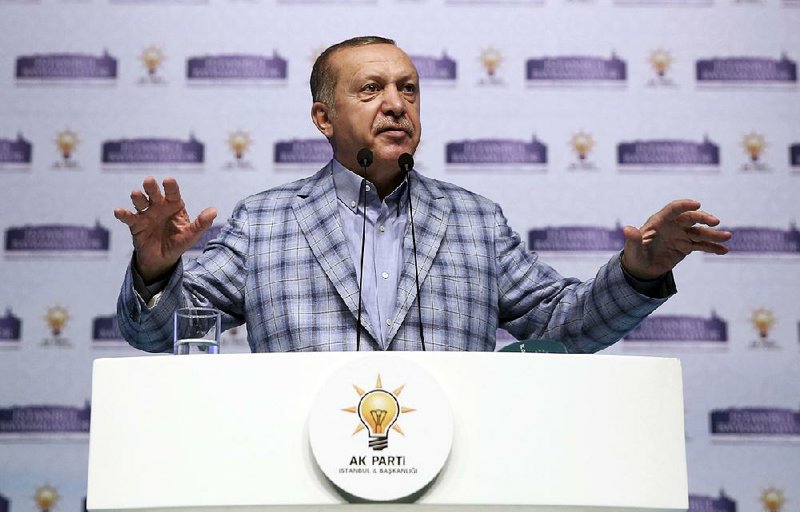ISTANBUL -- Turkey's president on Sunday rejected a demand by major Arab states to remove Turkish troops from Qatar, among a sweeping list of ultimatums that the United States has described as "difficult to meet."
Speaking after Eid al-Fitr prayers in Istanbul, President Recep Tayyip Erdogan called the demand to pull the Turkish troops "disrespectful" and said his country would not seek permission from others when making its defense cooperation agreements.
"Demanding that Turkey pull its soldiers is unfortunately also disrespectful toward Turkey," he said.
He said Turkey would continue to support Qatar against the many sanctions it has faced since several Arab countries moved earlier this month to isolate the country for what they say is its support of terrorism.
Erdogan argued that the demands on Qatar contradict international law and said Turkey "admires and embraces" Qatar's attitude.
"Here we see an attack against a state's sovereignty rights," Erdogan said.
Referring to the demand that Qatar shut down the Arabic news network Al-Jazeera within 10 days, Erdogan said the Arab states were attempting to take away the network's press freedom and urged rights groups to speak out against that.
Turkey has shipped suppliers and food via cargo planes to Qatar after its neighbors closed down air, land and sea routes. The Turkish military said a contingent of 23 soldiers reached Doha on Thursday. Erdogan said he made a similar offer to Saudi Arabia to set up a base there in the past but did not hear back from the king.
A Turkish foreign ministry statement Sunday reiterated that the deployment of Turkish troops in Qatar contributed to regional security and was not aimed at a specific country.
"Just like the presence of other foreign military bases or units in other countries of the region, our military presence in Qatar is principally based on a decision taken by the two countries relying on their sovereign rights," ministry spokesman Huseyin Muftuoglu said.
Qatar also hosts the Middle East's largest concentration of U.S. military personnel, with 11,000 people. President Donald Trump visited Saudi Arabia last month on his first overseas trip as president and announced a $110 billion deal to sell arms to the Saudis. He has expressed pleasure at the alliance of Arab states, all Sunni, against extremist groups and Iran, which is Shiite and the region's main rival to Saudi Arabia.
U.S. Secretary of State Rex Tillerson on Sunday criticized some of the 13 demands by Saudi Arabia, Egypt, United Arab Emirates and Bahrain on Qatar as "very difficult to meet," and urged the countries to start negotiating.
In addition to the order to oust Turkish troops and shut down Al-Jazeera, Qatar was told to halt all contact with groups such as the Muslim Brotherhood and reduce cooperation with Iran. It would also be required to undergo monthly checks to ensure it is complying.
"While some of the elements will be very difficult for Qatar to meet, there are significant areas which provide a basis for ongoing dialogue leading to resolution," Tillerson said in a statement, which urged the parties to sit down and have a conversation about what he called the "requests."
"We believe our allies and partners are stronger when they are working together towards one goal which we all agree is stopping terrorism and countering extremism," he said. "Each country involved has something to contribute to that effort. A lowering of rhetoric would also help ease the tension."
Trump has called the Saudi-led action against Qatar "hard but necessary."
Iranian President Hassan Rouhani disagreed, and told the Qatari Emir that the "siege of Qatar is not acceptable for us," according to the office of the presidency's website.
The Sunday report quotes Rouhani as telling Sheikh Tamim Bin Hamad Al Thani in a phone conversation: "Tehran will stand by Qatar's government."
"Iran's air space, ground and sea will be always be open to Qatar as a ... friendly nation," said Rouhani, and that the two nations' cooperation will remain "continuous."
Iran's president added that "pressure, threats and sanctions" are not solutions for resolving rifts.
Information for this article was contributed by Zeynep Bilginsoy and staff members of The Associated Press; and by Carol Morello of The Washington Post.
A Section on 06/26/2017


